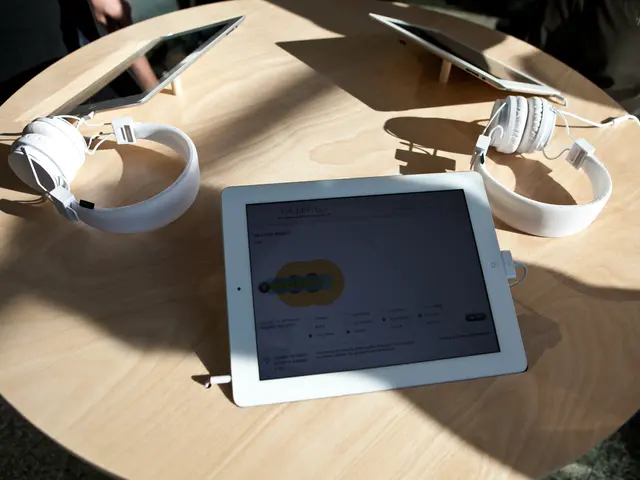Shift from traditional music classes to mass production through AI technology: Implications on the music industry.
The AI Revolution: The Impact on Musicians and the Future of their Rights
In today's digital age, AI tools can generate entire songs, raising questions about the future of music and the artists who create it. Germany, in particular, is at the forefront of this technological development, with specialized providers generating thousands of songs daily. However, this advancement comes with a significant downside: AI models use human musicians' works as templates, often without their consent.
STREAMING SERVICES FLOODED WITH AI-GENERATED MUSIC
Streaming service Deezer receives 20,000 AI-generated songs daily, as announced by the French provider in April. While these songs may not match human quality, the sheer volume of AI-generated music makes it harder for artists to stand out on streaming platforms. Famous artist Levina, who serves as chair of a council for musicians' rights in Britain, voices her concerns, stating, "And when so much of it is flooded with AI, it makes it even more difficult."
UNFAIR REVENUE DISTRIBUTION
Most musicians don't fundamentally oppose AI, but they do question the lack of fair compensation. AI models utilize human artists' work without remuneration, which feels unfair. "[M]illions and billions in revenue is generated when our songs are taken without us getting enough compensation,” says Christopher Annen of music industry association Pro Musik.
UNFAIR USE OF COPYRIGHTED MATERIAL
The German collecting society, GEMA, represents the rights of around 95,000 members in the German music industry. With AI likely to exacerbate the unequal distribution of income, GEMA fears a significant loss. The society estimates that 27% of creators' earnings are at risk, posing a potential risk of over 2.7 billion euros in Germany and France by 2028.
LEGAL ACTION AGAINST AI COMPANIES
In response, GEMA has taken legal action against AI companies. GEMA filed a lawsuit against OpenAI, the company behind ChatGPT, last year, seeking billions in damages and demanding the destruction of the entire training dataset used for ChatGPT, as the dataset allegedly contains copyrighted material without proper authorization. In January, GEMA also filed a lawsuit against US company Suno, whose AI program has reportedly recreated real songs almost identically, infringing upon creators' rights.
ARTITS NEED TRANSPARENCY AND FAIR COMMUNICATION
Levina demands that streaming services indicate which music comes from AI, arguing that artists need more openness about payments. The lack of transparency in the industry presents a significant challenge for musicians.
EMOTIONS CAN'T BE REPLICATED BY AI
Christopher Annen believes that AI can't replicate emotions, stating, "The AI hasn't experienced heartbreak." While AI can generate music, it cannot evoke the feelings that human emotions can bring to a composition.
Additional Insights:
- GEMA's CEO has been vocal about the need to address the unauthorized exploitation of copyrighted works by AI technologies and enforce creators' rights.
- AI providers should consider paying for access to copyrighted works used in their AI training in order to support creators financially and maintain a sustainable music industry.
References:
[1] "Gema sues OpenAI over copyright infringement: open letter on Litigation with OpenAI." (n.d.). Accessed 2023-05-16. https://www.gema.de/en/press-release/gema-sues-openai-over-copyright-infringement-open-letter-on-litigation-with-openai/
[2] "Gema files copyright infringement lawsuit against Suno over AI-generated music." (2023, February 8). Accessed 2023-05-16. https://techcrunch.com/2023/02/08/gema-files-copyright-infringement-lawsuit-against-suno-over-ai-generated-music/
- The rise of AI-generated music has led to concerns about unfair competition and revenue distribution among human musicians, with streaming services like Deezer receiving thousands of AI-generated songs daily.
- GEMA, a collecting society representing the rights of many musicians, has taken legal action against AI companies like OpenAI and Suno due to their use of copyrighted material without proper authorization, potentially risking billions in earnings for creators.







